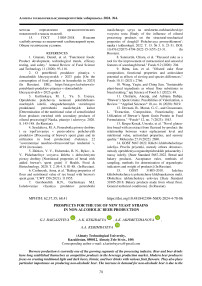Prospects for the use of new yeast strains in non-alcoholic beer production
Автор: Baigaziyeva G.I., Kekibaeva A.K., Akhmetzhanova A.K., Kerimbayeva A.A.
Журнал: Вестник Алматинского технологического университета @vestnik-atu
Рубрика: Технология пищевой и перерабатывающей промышленности
Статья в выпуске: 4 (146), 2024 года.
Бесплатный доступ
Brewery production is currently one of the growing segments of the processing industry. Beer and beer drinks have long established themselves as competitive products in the beverage production market. Modern beer producers focus on creating traditional light and dark beers, birmix, and beer drinks with various fruit flavours. They also place particular importance on producing non-alcoholic beer. The increase in demand for non-alcoholic beer is due to the partial transition to proper nutrition, the expansion of the assortment and the appearance of new flavours on the shelves. Non-alcoholic beer is a foamy beverage prepared according to classical beer production technology but with technological solutions for removing ethyl alcohol at the output. For the production of non-alcoholic beer, the permissible concentration of ethyl alcohol, which does not exceed 0.5%, is used. Vacuum distillation and membrane methods are used, and alcohol is removed by influencing the course of the technological process. One of these methods is the use of unique yeast strains in fermentation. The purpose of the presented research is to select new yeast strains for producing non-alcoholic beer. Four yeast strains were studied to determine their degree of digestion and influence on the profile of the finished beer. It was determined that yeast strain W 34/70 has the lowest degree of digestion. By technological and physicochemical parameters, the beer wort fermented by this yeast strain has suitable sensory parameters, which are not inferior to the production sample. The use of yeast strain W 34/70 also reduces the fermentation process and increases the shelf life of the finished beverage.
Beer production, non-alcoholic beer, yeast strain, ethyl alcohol, low digestion
Короткий адрес: https://sciup.org/140308699
IDR: 140308699 | DOI: 10.48184/2304-568X-2024-4-78-86
Список литературы Prospects for the use of new yeast strains in non-alcoholic beer production
- Durga Prasad C.G., Vidyalakshmi R., Baskaran N., Tito Anand M. Influence of Pichia myanmarensis in fermentation to produce quinoa based non-alcoholic beer with enhanced antioxidant activity // Journal of Cereal Science. - 2022, −Vol. 103.- рр. 112-117.
- Krebs G., Müller M. Charаcterization of the macromolecular and sensory profile of non-alcoholic beers produced with various methods // Food Research International. - 2019, −Vol. 116. − рр. 508-517.
- Kerimbayeva A. A., Akhmetzhanova A. A., Iztayev A. I., Baigaziyeva G. I., Kekibaeva A. A. Using of nontraditional raw materials in beer production. The Journal of Almaty Technological University. 2023; (1):12-18. https://doi.org/10.48184/2304-568X-2023-1- 12-18.
- Kharlamova L.N., Danilyan А.V., Sinelnikova M.Yu., Matveeva D.Yu. Non-alcoholic beer: Confirmation of quality. Production Quality Control. 2021;(10):44–47. (In Russ.). https://doi.org/10.35400/2541-9900-2021-10-44-47
- Оганнисян В. Г., Смотраева И. В. Особенности биохимических методов получения безалкогольного пива // Пиво и напитки. − 2007. − №5.− С.18-20.
- Adamenko K., Kawa-Rygielska J. Characteristics of Cornelian cherry sour non-alcoholic beers brewed with the special yeast Saccharomycodesludwigii//Food Chemistry. - 2020, Vol. 312.-рр.745-747.
- Bellut K., Michel M., Zarnkow M., Hutzler M., Jacob F., De Schutter DP., et al. Application of non-Saccharomyces yeasts isolated from kombucha in the production of alcohol-free beer. Fermentation. 2018;4(3). https://doi.org/10.3390/fermentation4030066
- Черкасова Е.С., Каменская Е.П. Оптимизация условий аэрации сусла в технологии безалкогольного пива // Технологии и оборудование химической, биотехнологической и пищевой промышленности: мат-лы XIII Все - рос. науч.-практ. конф. студентов, аспирантов и молодых ученых с междунар. участием. Бийск: Изд-во АлтГТУ, − 2020. −С. 401-404.
- Филимонова Т. И. Использование рас пивных дрожжей на российских предприятиях // Пиво и напитки. − 2008. − № 1. − С. 12-13.
- Давыденко С. Г., Афонин Д. В., Баташов Б. Э., Дедегкаев А. Т. Создание штамма дрожжей для нового пивного бренда «Балтика «Кулер» // Пиво и напитки. −2011. −№3.−С. 43-47.
- Аннемюллер Г., Мангер Г. Й., Литц П. Дрожжи в пивоварении. СПб.: Профессия. − 2015.−428с.
- Bellut K. Application of Non-Saccharomyces Yeasts Isolated from Kombucha in the Production of Alcohol-Free Beer // Fermentation. −2018. − Vol.4(66).−P. 1-19. DOI:10.3390/fermentation4030066.
- Bellut K. Investigation into the Potential of Lachancea fermentati Strain KBI 12.1 for Low Alcohol Beer Brewing // J. of the American Society of Brewing Chemists. − 2019. −V. 77 (3). − P. 157-169. DOI: 10.1080/03610470.2019.1629227
- De Francesco G., Sannino C., Sileoni V., et al. Mrakia gelida in brewing process: An innovative production of low alcohol beer using a psychrophilic yeast strain // Food Microbiology. — 2018. — Vol. 76. — P. 354–362. DOI: 10.1016/j.fm. 2018.06.018.
- Ахметжанова А.К., Байгазиева Г.И., Кекибаева А.К., Гривна Л. Сыра өндіруге арналған жаңа ашытқы штаммы // ТОО «Научно-производственный центр микробиологии и вирусологии», Микробиология и вирусология, № 4 (43) Алматы. − 2023. − С.133-139.


